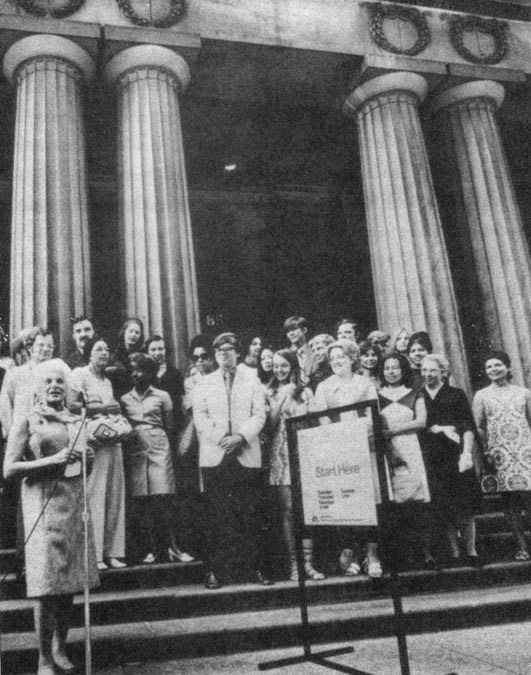Courtesy www.oakpark.com
Jeanette Fields, who served as the first Executive Director of Glessner
House from 1970 to 1976, passed away at her Oak Park home on Sunday November 2,
2014 at the age of 94. Fields came to
Glessner House, at that time owned and operated by the Chicago School of
Architecture Foundation (CAF), during a period of organizational growth and
left a lasting mark on both the house and CAF.
Marian Depres, one of the founders of CAF and a long-time advocate for
the house wrote the history of the organization in 1986. In Chicago
Architecture Foundation: The First Twenty Years 1966-1986, Depres recalls
Fields arrival at the landmark home and what was expected of her:
“(In 1970), Jeanette
Fields was hired as executive secretary to work for 24 hours per week. Although not an architect, she was deeply
interested in the subject. She lived in
a Frank Lloyd Wright house and had done public relations for various
organizations, including an architectural firm, for which she had conducted bus
tours. She had also done social work and
had secretarial abilities. In her new
job, all these skills were called upon.
“In the 24 hours per
week for which she had been hired, Fields was supposed to keep records, type
letters, manage the house, supervise the two students who lived on the second
floor (until the day she found one of them keeping his pet ocelot in the
kitchen), answer the telephone, and cope with starlings in the chimney and
pigeons in the coach house. She kept the
utilities functioning and decided which bills could most safely be
delayed. In addition, three afternoons a
week, she was to show visitors around the house. Every week during the summer, she managed to
bring in flowers from her garden for the front hall.
“Despite all these
demands, she began a vigorous and imaginative public relations program which
was significant in promoting the early growth of CAF. Board members, and later docents, began to be
seen and heard on radio and television.
Fields enlisted Stuart Talbot, an energetic volunteer who organized a
group to work every Monday evening. . . Things began to happen as a result of
the new publicity . . . More money began to come in. More people came to view the house. Fields soon was promoted to full-time, and
then hired Lynn Anderson, who had successfully taken the docent training class,
as a half-time assistant.”
Perhaps her greatest legacy is her work in establishing the docent
program, in partnership with Marian Depres.
In response to the increasing number of visitors coming to the house,
the two, in conjunction with Barbara Wriston (director of museum education at
the Art Institute of Chicago) and Kenneth Englund (a former teacher on the
staff of the Illinois Arts Council), gathered experts in the field to lead the
training and secured $5,000 in funding from the Illinois Arts Council to launch
the first docent training program. A
total of 36 people started the class in April 1971 and 33 graduated on June 12,
1971. It was Jeanette Fields who had the
idea of holding the graduation ceremony on the north steps of the Chicago
Public Library (now the Chicago Cultural Center). It was a brilliant move – reporters,
photographers, and TV cameras were there, and a representative from the Mayor’s
office gave the graduation speech. By
year end, almost 3,000 people had taken tours of the house and the Loop.
Another achievement of Fields’ tenure was the significant work leading
to the establishment of the Prairie Avenue Historic District. When she arrived in 1970, the idea was still
in its infancy, and many felt the street had already lost too much for a
district to have meaning. Fields and
others vigorously pursued the idea, forming the Prairie Avenue District
Committee in 1971. Their work resulted
in a co-partnership with the City of Chicago, bringing needed resources and
financial assistance to the project, along with $350,000 in funding from the
State of Illinois to purchase parcels of land.
By the time the district was landmarked in 1978, the streetscape of the
1800 block of Prairie Avenue had been restored to its 1890s appearance, and the
city had acquired and relocated the Clarke House to its present location.
During the Festival on Prairie Avenue held in 2008, Fields was honored
for her work on the creation of the district.
Her award read in part:
“In recognition of her
leadership as Executive Director of the Chicago Architecture Foundation from
1970 to 1976 during which period the groundwork was laid for a unique
public-private partnership with the City of Chicago that led to the
establishment of the Prairie Avenue Historic District. Presented
at the Festival on Prairie Avenue, celebrating the 30th anniversary of the
Prairie Avenue Historic District
September 6, 2008.”
Festival on Prairie Avenue, 2008. L to R:
Bill Tyre, Alderman Robert Fioretti, Jeanette Fields,
Mayor Richard M. Daley, Marian Premer,
Jack Simmerling, Tina Feldstein
Bill Tyre, Alderman Robert Fioretti, Jeanette Fields,
Mayor Richard M. Daley, Marian Premer,
Jack Simmerling, Tina Feldstein
Fields remained actively interested in both
Glessner House and the Prairie Avenue Historic District long after she
concluded her tenure as executive director in 1976. She enjoyed visiting to witness progress on
the house, and marveled at the dramatic redevelopment of the neighborhood
beginning in the mid-1990s. Each year
she was an honored guest as docents from the early classes gathered to
reminisce over the early years of the tour program.
Memorial wreath on the front door of Glessner House
Jeanette Fields was among the early group of
individuals to recognize the importance of Glessner House. The thousands of guests who visit each year from across the country and around the world are a testament
to her work in shepherding the museum through this important era in its growth
and development.






No comments:
Post a Comment